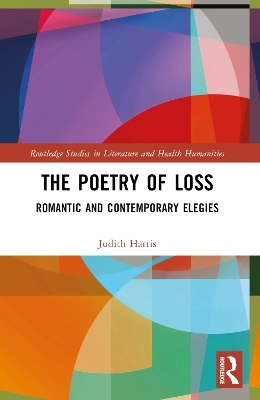
The Poetry of Loss
Routledge (Verlag)
978-1-032-00952-0 (ISBN)
The Poetry of Loss: Romantic and Contemporary Elegies presents a renewed look at elegy as a long-standing tradition in the literature of loss, exploring recent shifts in the continuum of these memorial poems. This volume investigates the tensions arising in elegiac formulations of grief through detailed analyses of seminal poets, including Wordsworth, Keats, and Plath, using psychoanalytic precepts to reconceptualize consolation through poetic strategies of inner representation and what it might mean for personal and collective experiences of loss. Tracing the development of elegy beyond extant readings, this volume addresses contemporary constructs of mourning and their attendant polemics within the wider culture as extensions of elegiac longings and the tendency to refuse consolation and cede to the endlessness of grief. Furthermore, this book concludes that contemporary elegies break with conventions of poetic structure and expression; rather than the poets seeking resolution to grief through compensation, they often find themselves dwelling within the loss rather than externalizing and transcending it. The Poetry of Loss: Romantic and Contemporary Elegies examines these developing psychoanalytic concepts pertaining to a poetics of loss, providing readers with a new appreciation of mourning culture and contemporary attitudes towards grief.
Judith Harris, Ph.D., is the author of three books of poetry (LSU) and a critical book Signifying Pain: Constructing and Healing the Self through Writing (SUNY Series in Psychoanalysis and Culture). She currently conducts seminars on poetry writing and psychoanalytic theory at the Writer’s Center in Bethesda, Maryland. She is associate editor of Clio’s Psyche: the Psychohistory Forum and has held academic positions in the English and Creative Writing Departments of George Washington University, American University, and Catholic University. She was awarded poetry residencies at Yaddo and Frost Place. Her poetry has appeared nationwide in The Atlantic, Slate, The Nation, The New Republic, The New York Times blog, The Hudson Review and the syndicated newspaper column, ‘‘American Life in Poetry.’’ Her essays have appeared in Division Review: A Quarterly Psychoanalytic Forum; The Chronicle; Psychoanalysis, Culture and Society; and The Canadian Journal of Psychoanalysis, and The British Journal of Guidance and Counselling. She was formerly affiliated with George Washington University, Catholic University, and American University. She has presented her work at the Library of Congress, Folger Shakespeare Library, and the American Psychoanalytic Association.
Introduction: The Elegiac Language and Expression of Grief
CHAPTER ONE: Psychoanalytic Theories of Mourning and the Failure to Mourn
CHAPTER TWO: The Lost Child in Wordsworth’s Elegies and John Bowlby’s Attachment and Loss
CHAPTER THREE: Loss and Beauty: Keats’s Women and the "Ode to Psyche"
CHAPTER FOUR: A Consolation of Beauty, Grief, and Sadness in Jane Kenyon’s Poems
CHAPTER FIVE: Sylvia Plath’s Mock and Self-Elegies: A Kleinian Reading of "Edge"
CHAPTER SIX: A Father’s Grief: Elegy and Counter-Tradition in Edward Hirsch’s Gabriel
CHAPTER SEVEN: An Inheritance of Terror: Postmemory and Intergenerational Transmission of Trauma in Second-Generation Jews after the Holocaust
CHAPTER EIGHT: The Canticles of Grief: Contemporary Elegies and the Limits of Mourning
CHAPTER NINE: The Literature of Loss: Elegies as a Therapeutic Strategy for Coping with Grief
Conclusion
| Erscheinungsdatum | 13.09.2024 |
|---|---|
| Reihe/Serie | Routledge Studies in Literature and Health Humanities |
| Verlagsort | London |
| Sprache | englisch |
| Maße | 152 x 229 mm |
| Gewicht | 331 g |
| Themenwelt | Geisteswissenschaften ► Sprach- / Literaturwissenschaft ► Anglistik / Amerikanistik |
| Geisteswissenschaften ► Sprach- / Literaturwissenschaft ► Literaturwissenschaft | |
| ISBN-10 | 1-032-00952-7 / 1032009527 |
| ISBN-13 | 978-1-032-00952-0 / 9781032009520 |
| Zustand | Neuware |
| Informationen gemäß Produktsicherheitsverordnung (GPSR) | |
| Haben Sie eine Frage zum Produkt? |
aus dem Bereich


